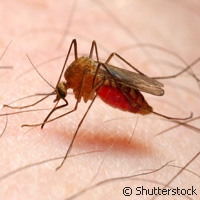Knowledge of parasite reproduction could lead to malaria breakthrough
By examining the way the malaria-causing parasite reproduces, European scientists have shown that altering the parasite's reproductive strategy could lead to new treatments for malaria. The parasite which causes malaria, Plasmodium, is transmitted though the bites of infected mosquitoes. In the human body, the parasites multiply in the liver before infecting red blood cells. The team of researchers, from Portugal and the United Kingdom, examined the parasite at a stage of its development where it produces male and female forms in the bloodstream of its victims. These parasites then breed inside mosquitoes to produce fresh offspring that are transmitted when the insects feed on other people or animals. The study, published in the journal Public Library of Science (PLoS) Pathogens, showed that killing either the male or female form of the parasite was ineffective at stopping the spread of the disease, because the parasites simply replace those which have been killed. The researchers, however, tried a different strategy of damaging both the male and female forms, rather than just killing either one of them. This meant that although the parasites could reproduce, their offspring did not survive. In a series of experiments conducted by the researchers, mathematical modelling was used to predict how transmission-blocking factors influence parasite sex allocation strategies. Their findings predict that despite gamete dysfunction and zygote mortality, parasites could still evolve strategies or traits to cope with a transmission-blocking intervention; however, these would have to be independent of sex allocation. By understanding the behaviour of parasites which have evolved to cope with naturally occurring factors, predictions can be made about how they will respond to a transmission-blocking factor, in the form of medical treatment. If a parasite's host environment is understood, scientists can develop effective treatments, and by unlocking the parasite's reproductive secrets they hope to be able to effectively treat malaria. 'Our studies show that inflicting just the right amount of damage could be the best way to interrupt the malaria parasite's development in the mosquito and help prevent the spread of disease,' said lead researcher Ricardo Ramiro from the University of Edinburgh's School of Biological Sciences in the UK. The World Health Organization (WHO) identifies the common symptoms of malaria: fever, headache, and vomiting, which normally develop between 10 and 15 days after a mosquito bite. If not treated, malaria can disrupt blood flow to vital organs, which is incredibly dangerous and life threatening. Malaria is normally controlled with interventions such as prompt and effective treatment with artemisinin-based combination therapies, the use of insecticidal nets by people at risk, and indoor residual spraying with insecticide to control the vector mosquitoes. In 2008, malaria caused nearly one million deaths, with children and pregnant women in sub-Saharan Africa being the most vulnerable, according to the WHO. The WHO also reports that in Africa a child dies every 45 seconds because of malaria, and the disease accounts for 20% of all deaths during childhood. Asia, Latin America, and to a lesser extent the Middle East and parts of Europe are also affected by the disease. Countries affected by malaria also suffer statistically higher economic losses, compared to malaria-free parts of the world. In countries where malaria is rife, the gross domestic product can decrease by as much as 1.3%. Malaria also puts a huge strain on public health infrastructures, and as it is most prevalent in poorer countries, the disease helps propagate this cycle of poverty, trapping whole communities. The fight against malaria is compounded by the resistance parasites have developed against a number of malaria medicines. But this new research offers some hope of an eventual cure: understanding the parasites' host environment and unlocking its reproductive secrets may help scientists develop effective treatments.For more information, please visit:University of Edinburgh:http://www.ed.ac.uk/homePublic Library of Science (PLoS) Pathogenshttp://www.plospathogens.org/home.action
Countries
Portugal, United Kingdom



